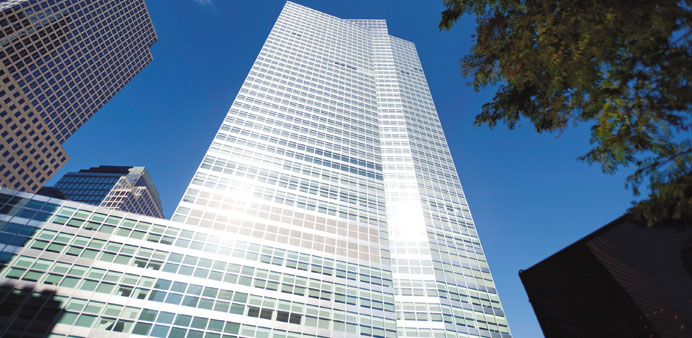The Goldman Sachs Group headquarters in New York. While Apple enters the Dow Jones Industrial Average, it’s Goldman Sachs Group that will see its influence on the 118-year-old gauge solidified, garnering the biggest weighting after a stock split by Visa.
Bloomberg/New York
One of the most recognisable companies in the world is about to cement its grip on the Dow Jones Industrial Average, and it’s not who you think.
While Apple enters the average, it’s Goldman Sachs Group that will see its influence on the 118-year-old gauge solidified, garnering the biggest weighting after a stock split this week by Visa. New York-based Goldman Sachs, with a 7.1% share, will be the first bank to hold the top spot since JPMorgan Chase & Co in 2000.
It’s testament to the quirkiness of the Dow’s listing structure that Apple, the world’s most valuable company at $748bn in market value, will take a backseat to a company that’s just over a 10th its size. Apple ranked as the ninth most-loved company in a Harris Poll earlier this year, while Goldman Sachs came in as the least loved.
“The Dow is very strangely constructed,” Donald Selkin, who helps manage about $3bn of assets as chief market strategist at National Securities Corp in New York, said in a phone interview. “You have the company with by far the highest market capitalization as the fifth-most influential stock in the index. The Dow is not exactly made up of the companies that best show where the economy is - it’s bizarre.”
The index, which was created in 1896 by Dow Jones & Co co- founder Charles H Dow, is weighted based on the share prices of the 30 companies in the average. Visa’s split will cut its share price by 75%, leaving Goldman, which closed Wednesday at $192.32, with the highest price in the gauge and the biggest weighting.
Apple, which has rallied 16% this year, will have the fifth highest weighting at 4.7%. The company accounts for 15% of the Nasdaq 100 Index and 4% of the S&P 500. Both rank members by market value. The technology gauge has advanced 4.4% in 2015, while the Dow has added 1.4%.
Visa accounted for more than 9% of the Dow before its split, which will cut the share price to about $67 and bump it down to 21st place behind DuPont Co
Goldman’s promotion will damp price swings, all else being equal. Trailing 20-day volatility for the shares has averaged 17.82% in the past year, compared with Visa’s 19.40%.
A 1% rise in Goldman Sachs shares would add 12 points to the Dow at current levels, while the same move in Apple would provide an 8-point boost, according to data compiled by Bloomberg.
Leslie Shribman, a spokeswoman for Goldman Sachs, declined to comment.
Goldman Sachs and Visa both entered the Dow in September 2013, when the average was last reshuffled. Along with Nike, they replaced Bank of America Corp, Hewlett-Packard Co and Alcoa. Visa has rallied 35% since it joined on Sept. 20, 2013, while Goldman Sachs gained 13%, compared with Dow’s 17% advance.
With Goldman Sachs primed to become the biggest piece of the Dow, earnings for banks in the S&P 500 are forecast to decline in each of the next two quarters. They will see profit contract 0.7% in the first quarter, followed by a 2.9% decrease in the second quarter, strategist data compiled by Bloomberg show.
New addition Apple and its five industry counterparts already in the Dow will fare better, according to the forecasts. Earnings for information technology companies in the S&P 500 will grow 4.7% and 7.7% over the next two quarters, respectively, the data show.
“The Dow is made up of financial companies and technology companies now,” Robert Pavlik, who helps oversee $9bn as chief investment strategist at Boston Private Wealth. “I don’t think it’s an industrial index anymore.”

